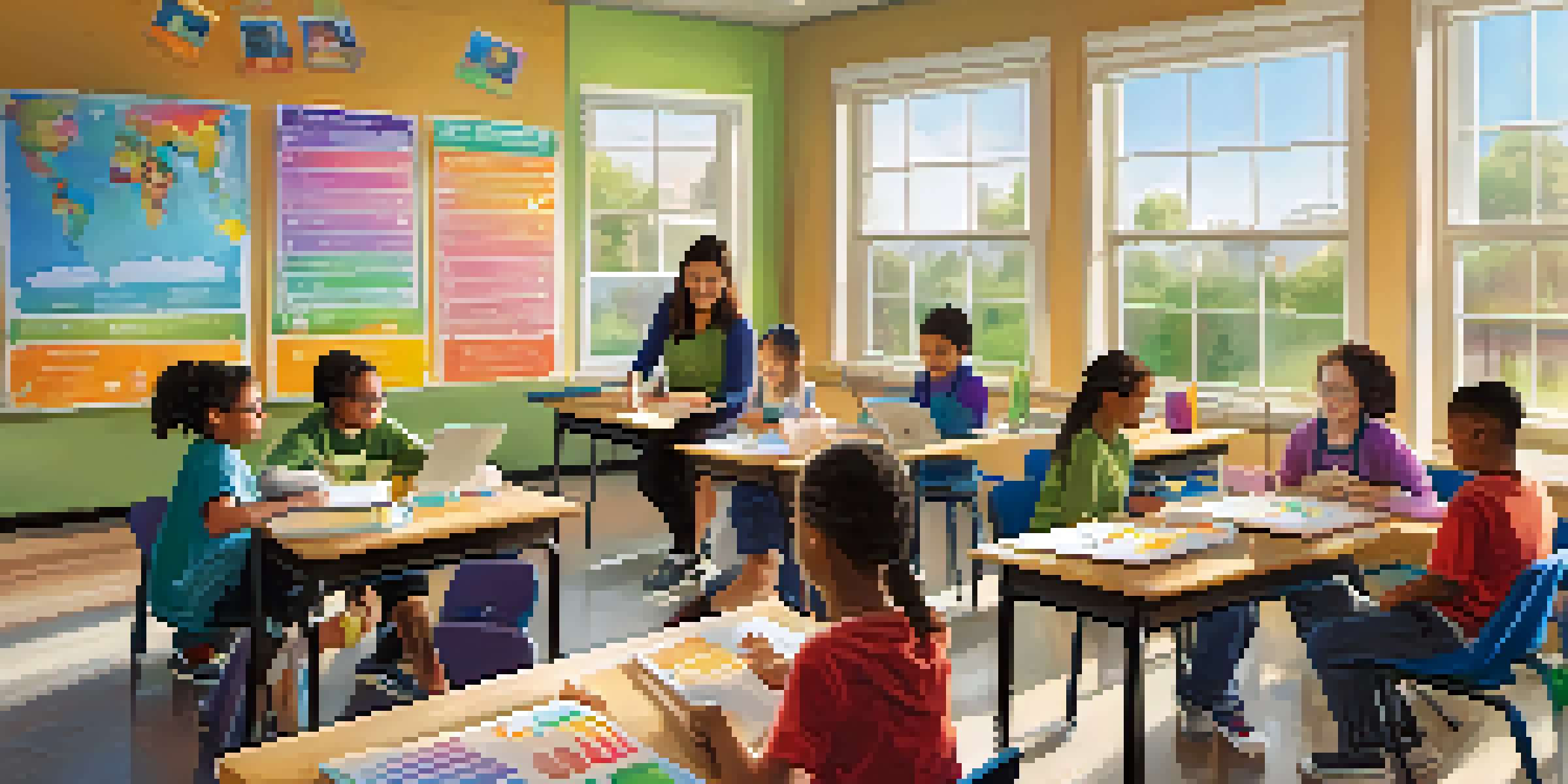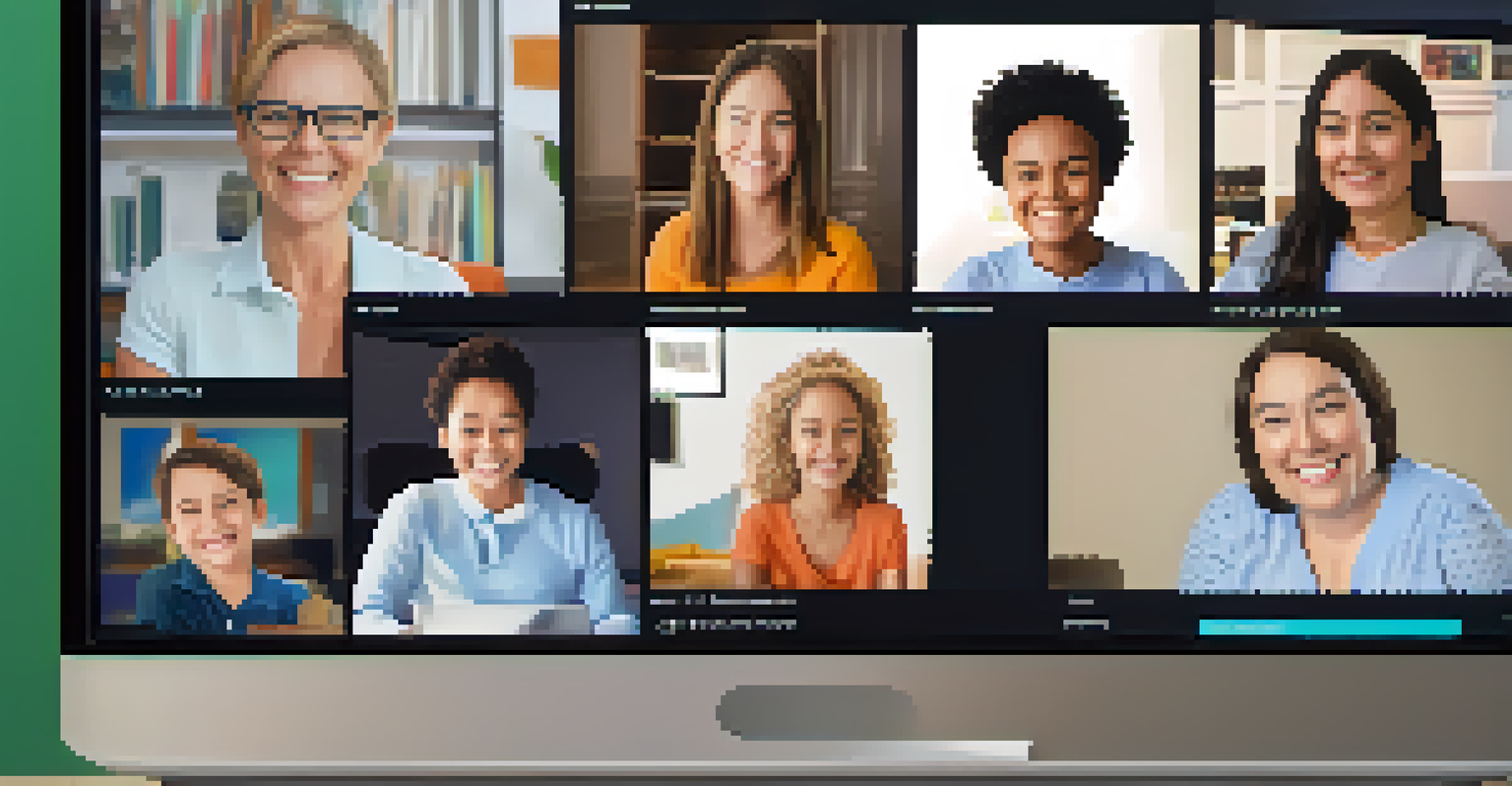Supporting Special Needs Education Through Social Media

The Role of Social Media in Education Today
Social media has transformed the way we communicate, making it an invaluable tool in education. It allows educators, students, and parents to connect and share resources efficiently. With platforms like Facebook, Twitter, and Instagram, information spreads quickly, creating a community around special needs education.
Social media is not just a tool, but a way to connect and create communities that support each other in the journey of education.
For example, a teacher can share lesson plans or strategies that have worked well for students with special needs, allowing others to benefit from their experiences. This collaborative nature fosters an environment where everyone can learn from one another. Students can also engage with peers, creating friendships that might not happen in traditional classroom settings.
Ultimately, social media bridges the gap between educators and families, ensuring that support for special needs students extends beyond the classroom.
Building Communities of Support Online
One of the most powerful aspects of social media is its ability to create supportive communities. Parents of children with special needs often feel isolated, but online groups provide a platform for sharing experiences and advice. This sense of belonging can be incredibly empowering, as families connect with others facing similar challenges.

These communities often share resources, from local events to educational materials, helping parents navigate the complexities of special needs education. For instance, a Facebook group dedicated to autism awareness may regularly post about workshops and therapies that have proven beneficial. Members can also celebrate milestones together, fostering positivity in their journeys.
Social Media Connects Educators & Families
Social media fosters collaboration among educators, students, and parents, creating a supportive community for special needs education.
By building these networks, social media not only informs but also uplifts families, showing them they are not alone in their experiences.
Advocacy and Awareness Through Social Media
Social media is a powerful tool for advocacy, raising awareness about special needs education. Campaigns can go viral, educating the public and influencing policy changes. For instance, hashtags like #DisabilityAwareness have been used to spotlight issues that affect individuals with disabilities.
The greatest gift is not being afraid to question. Social media provides a platform for dialogue and learning in special needs education.
Through compelling stories and visuals, advocates can share the realities of special needs education, challenging stereotypes and fostering understanding. This widespread visibility encourages society to rethink its approach to inclusion, urging schools and institutions to adapt and improve.
As awareness grows, so does the potential for meaningful change, making social media an essential ally in the fight for better educational opportunities.
Sharing Success Stories on Social Platforms
Success stories can be incredibly motivating, and social media is a perfect place to share them. By highlighting achievements—no matter how small—educators and families can inspire others in the special needs community. These narratives can show the possibilities that arise when support and resources align.
For example, a teacher might post about a student's progress in a mainstream classroom, showcasing adaptive strategies that worked. These stories not only celebrate individual accomplishments but also provide practical insights for others looking to replicate that success. They emphasize that every child has unique potential waiting to be unlocked.
Online Communities Empower Families
Supportive online groups allow parents of children with special needs to share experiences and resources, reducing feelings of isolation.
In sharing these victories, social media becomes a source of hope and motivation for families navigating similar paths.
Utilizing Social Media for Resource Sharing
Social media platforms are treasure troves of resources for special needs education. Educators and parents alike can find a plethora of tools, articles, and videos that cater to various learning styles. By following the right pages and groups, they can stay updated on the latest research and effective teaching methods.
For instance, a quick search on Twitter can yield a list of educators who share their favorite lesson plans or technology tools for students with special needs. This sharing culture not only saves time but also enhances the quality of education provided. It allows everyone to benefit from collective knowledge and experience.
As users curate and share these valuable resources, social media becomes a dynamic platform for continuous learning and improvement.
Engaging with Experts in Special Needs Education
Social media also opens the door to engaging directly with experts in special needs education. Educators, therapists, and advocates often share their insights and research findings through blogs, webinars, and live Q&A sessions. This access to expertise can greatly enhance the support available to families and educators.
For example, a parent might attend a live stream hosted by a special education expert, gaining insights into effective strategies for home learning. These interactions break down barriers, creating opportunities for dialogue and knowledge exchange. It encourages a culture of learning where everyone can ask questions and seek guidance.
Advocacy and Awareness Drive Change
Social media serves as a powerful tool for advocacy, raising awareness and influencing policy changes in special needs education.
By leveraging social media for expert engagement, families can empower themselves with knowledge and tools to better support their children.
Navigating Challenges of Social Media Use
While social media offers many benefits, it's essential to navigate its challenges carefully. Misinformation can spread quickly, leading to confusion and misguidance. Families must be discerning about the sources they follow, ensuring that the information comes from credible experts in special needs education.
Moreover, privacy concerns are paramount, as sharing personal stories can expose families to unwanted attention or judgment. It’s crucial to maintain boundaries and protect sensitive information while still engaging in discussions. Educators and parents should communicate openly about what is appropriate to share online.

By being cautious and informed, users can enjoy the advantages of social media while minimizing potential risks.
The Future of Special Needs Education and Social Media
Looking ahead, the role of social media in special needs education is likely to expand. As technology evolves, new platforms and tools will emerge, offering even more ways to connect and share. Virtual reality, for instance, could enhance learning experiences, and social media will play a key role in disseminating these innovations.
Additionally, as more families and educators embrace these platforms, the push for inclusivity in education will gain momentum. Social media will continue to serve as a catalyst for change, fostering collaboration among stakeholders in the education system.
In essence, the future holds great promise for leveraging social media to enhance special needs education, ensuring that every child receives the support they deserve.